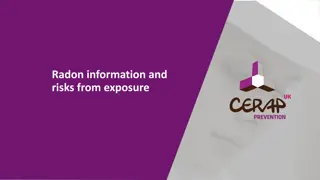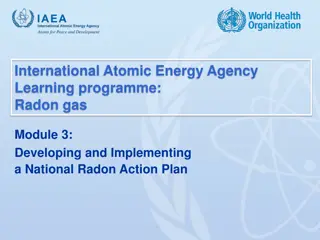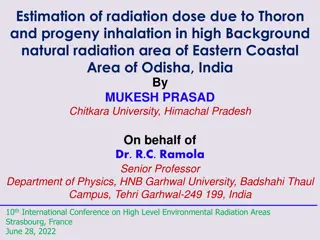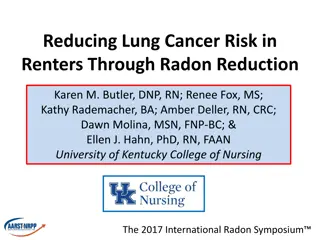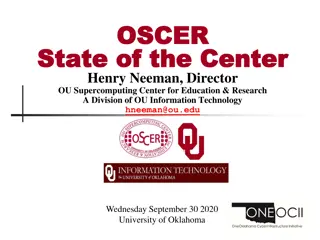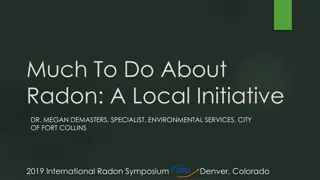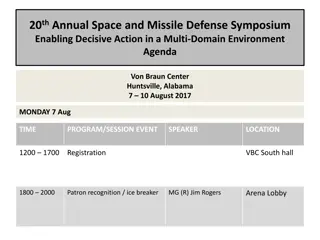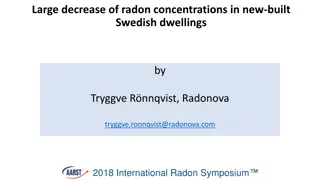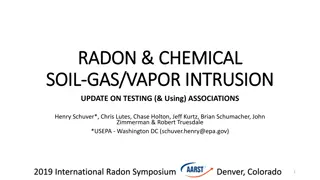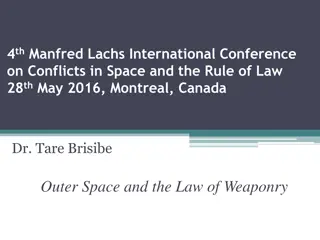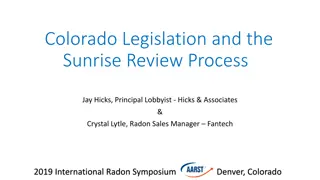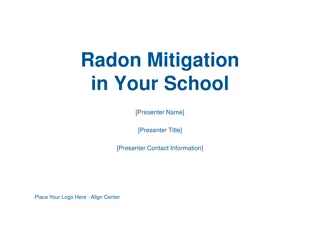2017 International Radon Symposium: Crawl Space Safety Guidelines
The content discusses important safety guidelines related to working in confined spaces such as crawl spaces, attics, and pits as presented at the 2017 International Radon Symposium. Topics covered include the definition of confined spaces, permit requirements, written confined space programs, respiratory protection, and safety equipment relay. Employers' responsibilities, employee safety measures, and dealing with hazardous atmospheres are highlighted throughout the symposium.
Download Presentation

Please find below an Image/Link to download the presentation.
The content on the website is provided AS IS for your information and personal use only. It may not be sold, licensed, or shared on other websites without obtaining consent from the author. Download presentation by click this link. If you encounter any issues during the download, it is possible that the publisher has removed the file from their server.
E N D
Presentation Transcript
2017 Crawl Space Olympics Round 1 The 2017 International Radon Symposium
Tunnel Relay Question The 2017 International Radon Symposium
A confined space has; limited means of entry and/or exit, is large enough for a worker to enter it and is not intended for regular/continuous occupancy. Examples include sewers, pits, crawl spaces, attics, boilers, and many more. Round 1 Heat 1 Question TRUE True OR False The 2017 International Radon Symposium
A permit required confined space is a confined space that may have a hazardous atmosphere, engulfment hazard, or other serious hazard such as exposed wiring, that can interfere with a worker s ability to leave the space without assistance. Round 1 Heat 2 Question TRUE True OR False The 2017 International Radon Symposium
If an employer has employees that enter permit required confined spaces, the employer is required to have a written confined space program. Round 1 Heat 3 Question TRUE True OR False The 2017 International Radon Symposium
If the radon concentration in a crawl space is known to be 30 pCi/L or greater and ventilating the space is not an option to reduce the radon level, the employer must have a respiratory protection program in place prior to sending an employee into the space. Round 1 Heat 4 Question TRUE True OR False The 2017 International Radon Symposium
2017 Crawl Space Olympics Round 2 The 2017 International Radon Symposium
Safety Equipment Relay Safety Glasses Safety Glasses Dust Mask Dust Mask Gloves Gloves Tyvek Suit Tyvek Suit Knee Pads Knee Pads Booties Booties The 2017 International Radon Symposium
If a homeowner requests a Safety Data Sheet for materials a contractor is using in their home, the contractor is allowed to deny that request if the material being used is a trade secret. Round Heat 1 Question False True OR False The 2017 International Radon Symposium
OSHA requires employers to have a worker protection plan. This plan requires employers to disclose hazards employees may encounter on a job site, including in crawl spaces. Some crawl space hazards that may be included are: Radon, sharp objects, varmints, hantavirus, mold, asbestos, and VOC s. TRUE True OR False Round 2 Heat 2 Question The 2017 International Radon Symposium
2017 Crawl Space Olympics Championship The 2017 International Radon Symposium
Fix The Crawl! Question The 2017 International Radon Symposium
Radon mitigation standards require dirt crawl space floors to be covered with a minimum 6 mil vapor barrier with the seams overlapped 12 inches. Sealing seams and edges is not required, but is highly recommended. Why is sealing the seams and edges of the membrane important? a) To reduce conditioned air from being drawn into the radon system and exhausted outside. b) To extend the pressure field under the membrane. c) To allow for the use of a lower wattage lower flow fan (typically quieter). d) To prevent backdrafting of combustion appliances e) All of the above. e) All of the above. Championship Question The 2017 International Radon Symposium


